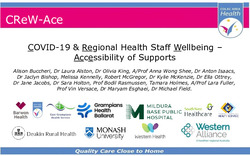Please use this identifier to cite or link to this item:
http://hdl.handle.net/11054/2906| Title: | CReW-Ace: COVID-19 & regional health staff wellbeing – Accessibility of supports. |
| Author: | Buccheri, A. Alston, A. King, O. Wong Shee, Anna Isaacs, A. Bishop, J. Kennelly, M. McGregor, R. McKenzie, K. Ottrey, E. Jacobs, J. Holton, S. Rasmussen, B. Holmes, T. Fuller, L. Versace, V. Esghaei, M. Field, M. |
| Issue Date: | 2024 |
| Conference Name: | Western Alliance Annual Symposium |
| Conference Date: | November 11-12 |
| Conference Place: | Lorne, Australia |
| Abstract: | Background/aim: There is extensive evidence that the mental health and wellbeing of health service staff has been impacted by the COVID-19 pandemic. Ensuring health service staff wellbeing is important for employee quality of life and workforce retention, which in turn can influence the quality of patient care and service provision. Rural health service staff experience unique challenges in the workplace, including geographical isolation, limited access to resources, and greater likelihood of sole practitioner status. In our previous research (lead by rural and regional health services), workplace factors such as team support, leadership and staff recognition were shown to have both positive and negative influences on staff wellbeing. There is currently little evidence about how to effectively implement wellbeing support initiatives in health services to address these workplace factors, particularly in the rural Australian context. CReW-Ace is a multi-site study that aims to identify and understand the factors that influence the provision of, and access to, wellbeing supports in rural and regional Victorian health services. Population/setting: Participants were recruited from leadership, human resources and / or staff wellbeing teams from seven public sector health services across rural and regional communities in Victoria. Methods: Focus groups were conducted to identify existing workplace wellbeing strategies, barriers and facilitators to provision of and access to wellbeing strategies. Focus group data was analysed thematically. Results/findings: Sixteen participants from seven health services took part in four focus groups, held online. Preliminary analysis has identified: 1) the existence of a wide range of wellbeing strategies within health services; 2) barriers to wellbeing strategies (e.g. limited funding/infrastructure, diversity across health workforce roles, staffing challenges); 3) facilitators of wellbeing strategies (e.g. increased focus on staff wellbeing following the COVID-19 pandemic, wellbeing strategies that required minimal time commitment from staff); and 4) factors relating to obtaining staff feedback on existing and future wellbeing strategies. Conclusion: Study not yet completed. Translational impact/implications for future practice: Findings from this work will inform survey design for gathering data on staff wellbeing and access to wellbeing strategies across participating sites. The outcomes of this research will guide both recommendations and future intervention design for rural and regional health services to support the wellbeing of their employees. |
| URI: | http://hdl.handle.net/11054/2906 |
| Internal ID Number: | 02879 |
| Health Subject: | COVID-19 MENTAL HEALTH STAFF WELLBEING WELLBEING SUPPORT |
| Type: | Conference Presentation |
| Appears in Collections: | Research Output |
Files in This Item:
| File | Description | Size | Format | |
|---|---|---|---|---|
| WA_symposium_presentation_CReW-Ace_2024.pdf | 259.41 kB | Adobe PDF |  View/Open |
Items in DSpace are protected by copyright, with all rights reserved, unless otherwise indicated.
